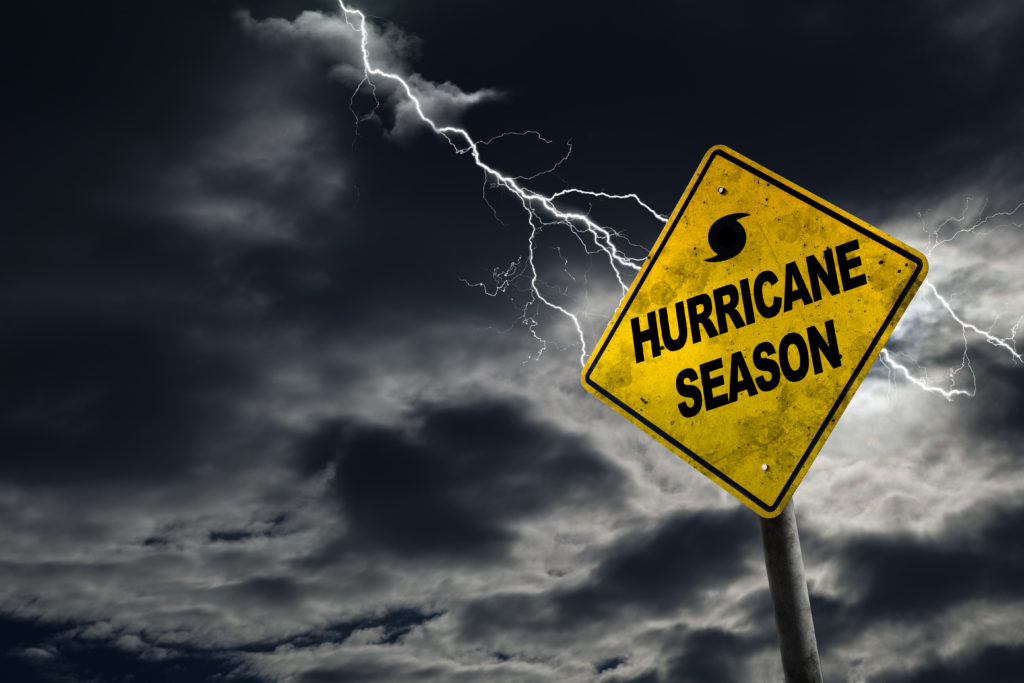Texans who live within 100 miles of the gulf have deep, personal knowledge about hurricanes. The Atlantic hurricane season starts on June 1 and regularly runs through Nov. 30. In Texas, the peak hurricane month is August, during which we’ve seen 17 hurricanes, including Harvey in 2017, the costliest in state history.
The Lone Star State has endured the second most hurricanes—behind only Florida—recording 64 since 1851 as documented by the National Hurricane Center. Now is a good time for Texans to equip themselves for the looming extreme weather season. Patten Title wants to ensure that you’ve taken all the precautions to keep you, your family and your home safe from harm. Here are our recommendations for getting well prepared for Texas’ hurricane season.
- HAVE AN EMERGENCY PLAN
- PREPARE A GO-BAG
- PREPARE YOUR PROPERTY
- COLLECT PERSON RECORDS AND ITEMS
- PREPARE FOR EXTREME WEATHER
-
HAVE AN EMERGENCY PLAN
HAVE AN EMERGENCY PLAN
Before a hurricane hits, decide if your family will stay in your home or hometown or exit to an area with shelter. Discuss plans with family and friends outside of the hurricane zone to ask if you can stay with them in an emergency.
If you plan to stay in the area, find out where the nearest shelter is to your home. Watch for storm updates on TV, online, or listen to the radio. Find out which roads aren’t flooded by checking Drivetexas.org. If your community has a flood map, be sure to get a copy.
Other preparations to consider include:
- Family: Talk with your elderly and disabled family and friends this summer about their emergency plans. Know that they are in a safe place before the hurricane hits.
- Fuel: When a hurricane is imminent, have at least a half tank of gas in your car.
- Pets: Consider how to care for your pets in your exit strategy. Make sure they are chipped and have a tag with your contact information on a collar.
- Cell phones: Charge your phone regularly and make sure you have an extension to charge it in your car. Also, consider wireless charger fobs to keep your phone charged if there is an electrical outage.
- Listen to authorities: Government officials will make recommendations about when to evacuate. Follow their guidance and grab your prepared go-bag(s).
- Hurricane watch or warning: A hurricane “watch” means that conditions are ripe for a hurricane and is issued 36-48 hours before a storm is likely to reach landfall. A hurricane “warning” means that hurricane conditions have developed and could hit your area.
2. PREPARE A GO-BAG
Everyone in your household should prepare a “go-bag” with essentials if you are away from your home for one or more days. If you have smaller children, incorporate items to play with and occupy time, like crayons, coloring books, or toys that don’t require batteries.
All go-bags should include:
- Flashlight: Have a working flashlight with extra batteries.
- Medicine: Set aside medical prescriptions, vitamins and essential medication.
- Food: Have at least a three-day supply of non-perishable food and water.
- Clothes: Pack a variety of clothes, making sure some of them are waterproof. You should also have items that keep you warm if you are stranded outside.
3. PREPARE YOUR PROPERTY
Your property is likely your most significant investment and asset, and you want to protect it from major weather events. Consider having some supplies on hand before a storm hits when reserves of lumber and generators are more difficult to find.
If a hurricane warning turns into a hurricane watch, you’ll want to:
- Move all unanchored items: That could include grills, lawn chairs and potted plants. Find a safe space to store them, like a garage or a cellar.
- Cars: Make sure all vehicles are away from trees and power lines. Keep an emergency kit in the car in case you have to drive, including jumper cables, flashlights and flairs.
- Utilities: Turn off your electricity, gas and water if you leave your home.
- Windows: Remove your screens. Nail plywood across the window frames to protect them from heavy winds.
4. COLLECT PERSONAL RECORDS AND ITEMS
Before a hurricane hits, have copies of your personal records handy. You’ll want to know where your pertinent policies are so that you can call your insurance adjuster in the aftermath of a storm. If you don’t have flood or windstorm insurance now, be aware that it could take 30 days after purchase for the policy to take effect.
Keep an envelope with you:
- Insurance policies: Understand your homeowner’s and flood insurance policies, knowing what each will cover. If you have hard copies, pack them in a plastic bag to take with you.
- Valuables: Have a plan to move anything of great value, like a coin collection or jewelry that has sentimental value, to a safe spot. Also, take photos of valuables and items around your home and have a thumb drive of those records on you or in a safety deposit box. These images will help your insurance adjuster in case of loss or damage.
- Medical records: An updated list of current medical conditions, vaccines, and allergies for the family are important to have.
5. PREPARE FOR EXTREME WEATHER
If you choose to stay in your home when extreme weather hits, be prepared for variations of how storm damage can impact property.
- High winds: Stay away from windows and find space at the lowest point in your house. Avoid staying near heavy furniture, like a bookcase or a large cabinet.
- Flooding: Move to higher ground if there is flooding.
- Driving: If you come upon a flood, go backward or away from it to avoid damage to your vehicle.
- Call for help: Contact 9-1-1 if you are in an emergency situation.


